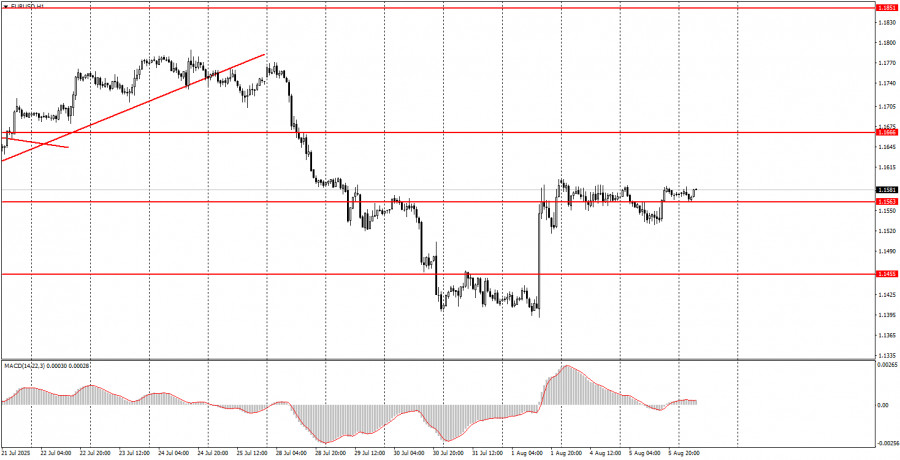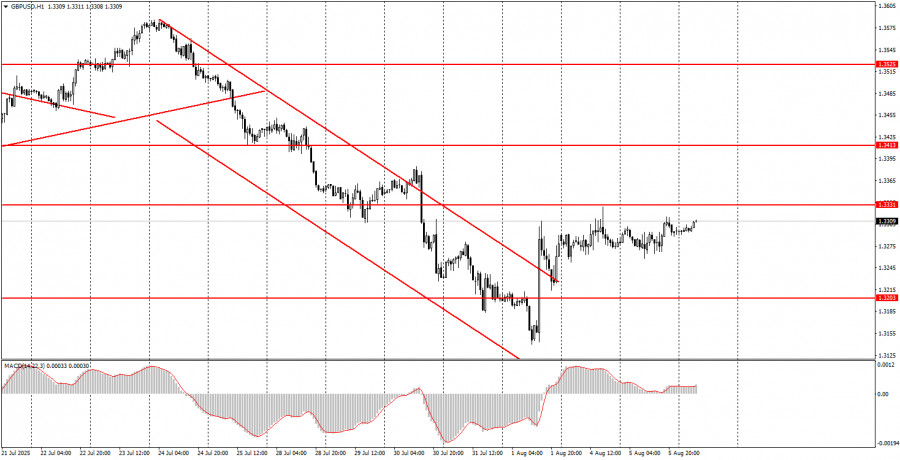Analysis of Macroeconomic Reports:
Only one macroeconomic report is scheduled for Wednesday. In the morning, the European Union will release its retail sales report, which is unlikely to be considered significant. For example, yesterday's ISM business activity report in the U.S. was far more important, yet even with a notably resonant reading, it provoked a reaction of only about 30 pips. The market is clearly in a state of hibernation.
Analysis of Fundamental Events:
There is once again absolutely nothing noteworthy among Wednesday's fundamental events. Late in the evening, a speech will be given by Federal Reserve monetary policy committee member Lisa Cook, which is of interest, as is any FOMC member speech at the moment. The likelihood of a rate cut in September has risen to nearly 90% following the latest labor market data. Any confirmation from Federal Reserve officials of their readiness to vote in favor of monetary policy easing will be welcome.
The top issue for the market remains the trade war, which took on new dimensions last Friday. We continue to believe that any trade agreement that preserves tariffs is essentially still a trade war, just "under a different label." Deals like those concluded with the EU or Japan are certainly favorable for the U.S., and each new such agreement may provoke further strengthening of the U.S. dollar. However, from a broader and fundamental perspective, the market will continue to keep in mind the new trade architecture and Donald Trump's protectionist policies.
The U.S. president continues to introduce new tariffs and raise existing ones, aiming to extract payment from all countries worldwide. We already got a sense of how the U.S. economy might respond last week: GDP may still grow, but most other macroeconomic indicators likely won't. Recently, Trump has raised tariffs on 60 countries and is now planning to impose duties on India, which refuses to stop purchasing Russian oil.
Conclusions:
On the third trading day of the week, both currency pairs may resume the upward movement that began last Friday. In our view, the numerous negative events for the dollar on Friday could fuel euro and pound strength for the entire week. The euro may continue rising from the 1.1527–1.1571 zone, and a corresponding buy signal has already formed. The British pound bounced off the 1.3259 level yesterday and will now attempt to overcome the 1.3329–1.3331 area.
Key Rules for the Trading System:
- Signal Strength: The shorter the time it takes for a signal to form (a rebound or breakout), the stronger the signal.
- False Signals: If two or more trades near a level result in false signals, subsequent signals from that level should be ignored.
- Flat Markets: In flat conditions, pairs may generate many false signals or none at all. It's better to stop trading at the first signs of a flat market.
- Trading Hours: Open trades between the start of the European session and the middle of the US session, then manually close all trades.
- MACD Signals: On the hourly timeframe, trade MACD signals only during periods of good volatility and a clear trend confirmed by trendlines or trend channels.
- Close Levels: If two levels are too close (5–20 pips apart), treat them as a support or resistance zone.
- Stop Loss: Set a Stop Loss to breakeven after the price moves 15–20 pips in the desired direction.
Key Chart Elements:
Support and Resistance Levels: These are target levels for opening or closing positions and can also serve as points for placing Take Profit orders.
Red Lines: Channels or trendlines indicating the current trend and the preferred direction for trading.
MACD Indicator (14,22,3): A histogram and signal line used as a supplementary source of trading signals.
Important speeches and reports, which are consistently featured in the news calendar, can significantly influence the movement of a currency pair. Therefore, during their release, it is advisable to trade with caution or consider exiting the market to avoid potential sharp price reversals against the prior trend.
Beginners in the Forex market should understand that not every transaction will be profitable. Developing a clear trading strategy and practicing effective money management are crucial for achieving long-term success in trading.














